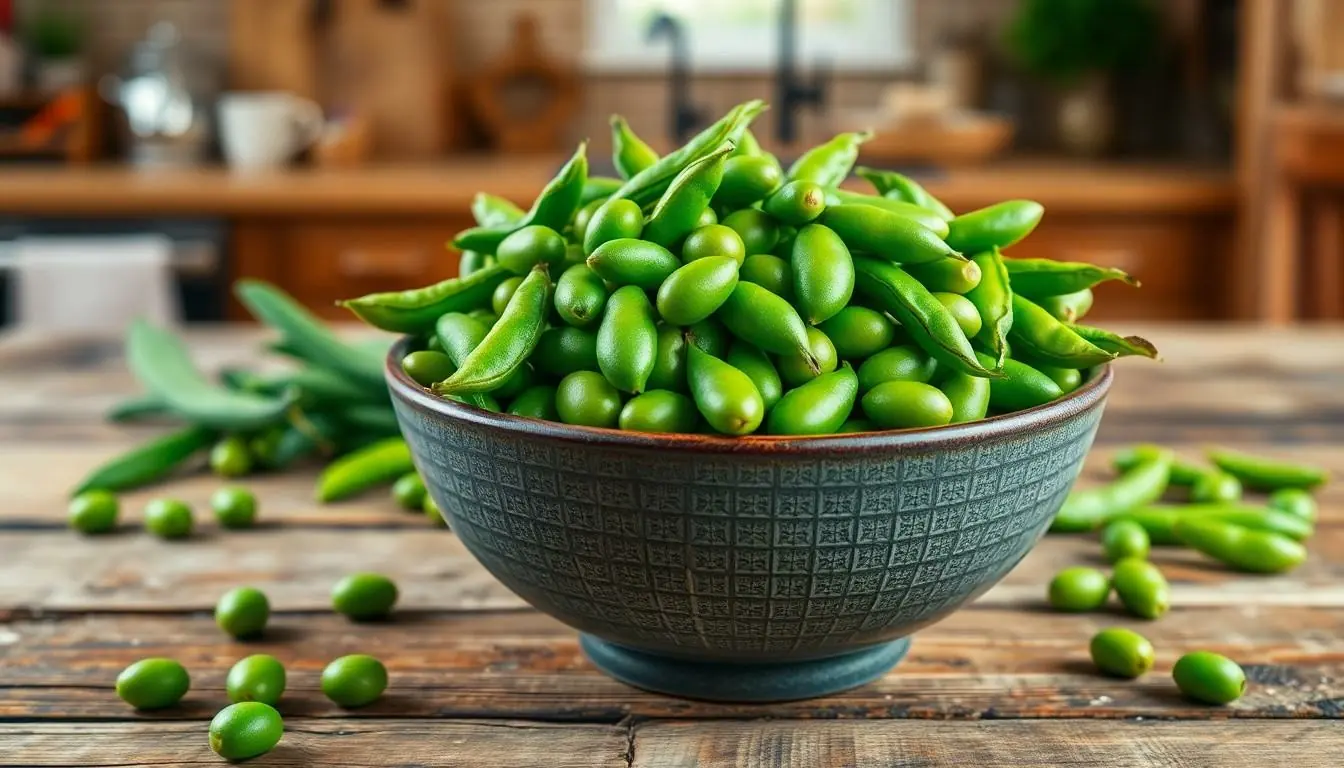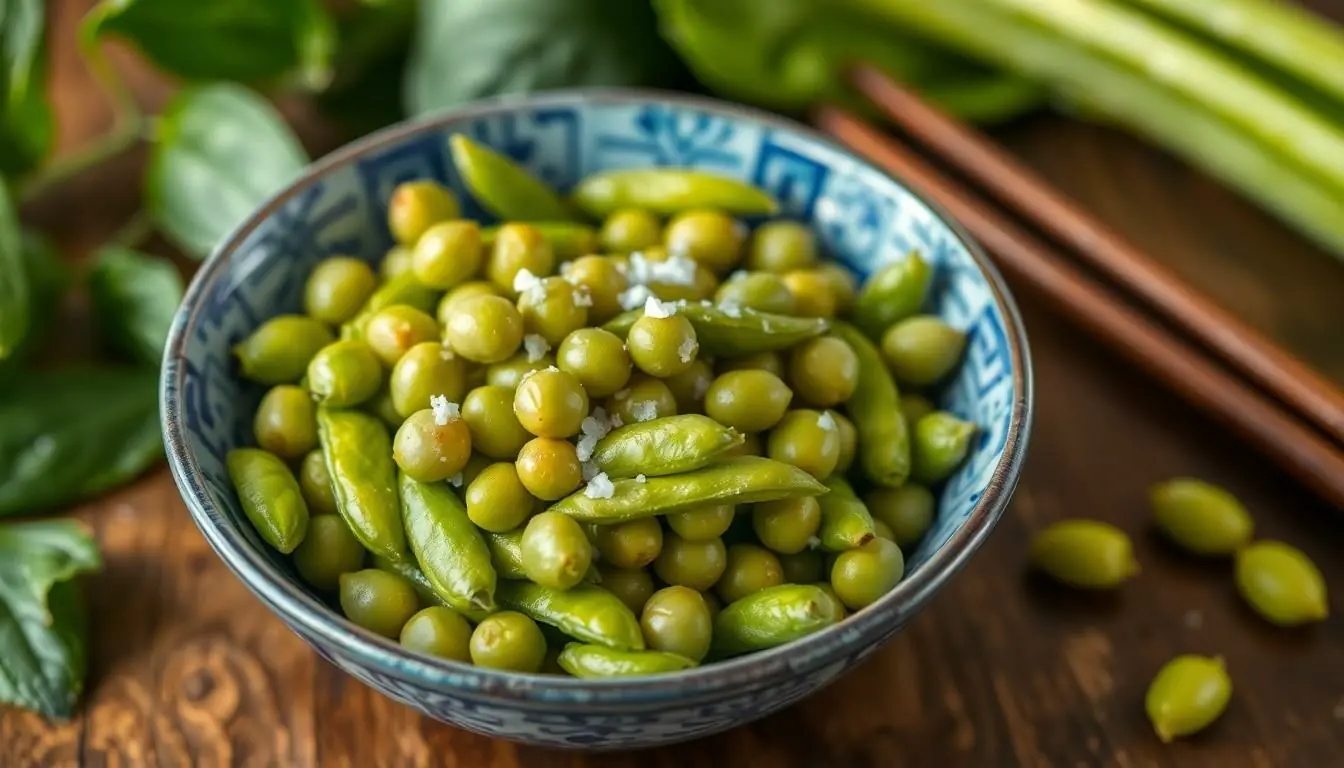When it comes to snacking, Costco’s edamame is the unsung hero of the frozen aisle. Packed with protein and fiber, these little green gems are not just a trendy appetizer; they’re a nutritional powerhouse ready to transform snack time. Who knew munching on soybeans could feel so good?
Table of Contents
ToggleOverview Of Costco Edamame
Costco’s edamame is a popular choice in frozen snacks. This product features whole soybeans, packed with nutrients. Each serving contains about 120 calories. Protein content stands at approximately 11 grams, making it an excellent source for those seeking plant-based options. Fiber content reaches around 5 grams per serving, promoting digestive health.
Rich in vitamins and minerals, Costco’s edamame includes vitamin K, folate, and magnesium. These nutrients support overall wellness and contribute to a balanced diet. Antioxidants found in edamame may also help protect against chronic diseases.
Pre-packaged for convenience, Costco’s edamame is easy to prepare. Simply steam or microwave for a quick snack. Popular ways to enjoy this product include adding salt, tossing in salads, or incorporating into stir-fries.
Customers appreciate the availability of both organic and conventional varieties. Choosing organic provides an option for those seeking pesticide-free alternatives. Additionally, purchasing bulk packaging offers an economical choice for families.
Overall, Costco’s edamame stands out for its nutritional value and versatility. It’s a snack option that aligns with health-conscious diets while satisfying cravings. Those looking for nutritious, ready-to-eat snacks find edamame a compelling addition to their shopping cart.
Nutritional Profile

Costco’s edamame provides a balanced mix of macronutrients and micronutrients that support overall health. Each serving contributes to a nutritious diet with significant amounts of essential nutrients.
Macronutrients
Costco’s edamame contains approximately 120 calories per serving. Protein content is notable, at around 11 grams, making it a strong plant-based protein source. Fiber also plays a key role, with about 5 grams per serving, which aids digestion and promotes a feeling of fullness. Fat content is minimal, typically around 5 grams, mostly from healthy unsaturated fats. The combination of protein, fiber, and healthy fats makes edamame a satisfying snack option.
Micronutrients
A serving of Costco’s edamame offers valuable vitamins and minerals. Vitamin K supports bone health and blood clotting, while folate is essential for DNA synthesis and cell growth. Magnesium contributes to muscle function and energy production. Additionally, edamame contains antioxidants that help combat oxidative stress. These micronutrients enhance the overall nutritional value and benefits of including edamame in a balanced diet.
Health Benefits
Costco’s edamame offers several health benefits that contribute to a balanced diet. Its nutritional profile supports overall wellness.
Excellent Source Of Protein
Edamame provides a substantial protein source, delivering approximately 11 grams per serving. This plant-based protein aids in muscle repair and growth. Protein also promotes satiety, helping to curb hunger between meals. Parents often appreciate its value in children’s diets, offering a nutritious alternative to traditional snacks. Including edamame in meals proves beneficial for vegetarians and vegans seeking protein-rich options. Evidence suggests that incorporating soy protein can help lower cholesterol levels. This makes Costco’s edamame a smart choice for those looking to improve their heart health.
Rich In Fiber
Each serving of edamame contains around 5 grams of fiber, supporting digestive health and regularity. Fiber intake is linked to a lower risk of heart disease and type 2 diabetes. Including fiber in meals encourages fullness, which can assist with weight management. Costco’s edamame is a great way to enhance fiber intake with minimal added calories. Whole food sources like edamame strengthen dietary patterns, reinforcing the importance of including diverse nutrient-rich foods. Many individuals find that adding edamame to salads or stir-fries enhances both flavor and fiber content in their diets.
How To Incorporate Edamame Into Your Diet
Incorporating edamame into a diet can be simple and enjoyable. This versatile snack enhances nutrition with minimal effort.
Snack Ideas
Snack on steamed edamame sprinkled with sea salt for a delightful treat. Opt for edamame hummus as a unique dip for veggies or whole-grain crackers. Blend edamame into smoothies for a protein boost without overwhelming flavors. Roasted edamame offers a crunchy alternative that pairs well with various seasonings. Try including it in rice bowls for a wholesome in-between meal option. Enjoying it chilled with a squeeze of lemon adds a refreshing twist to the snack experience.
Meal Additions
Add edamame to salads for flavor and texture enhancement. Tossing it into stir-fries elevates conventional recipes with added protein and fiber. Incorporate it into grain dishes, like quinoa or farro, to enrich nutritional profiles. Top soup with shelled edamame for an interesting garnish that also increases nutrition. Mix into pasta dishes as a healthy substitute for traditional protein sources. Using edamame in omelets creates a filling breakfast option packed with essentials.
Costco’s edamame serves as an excellent choice for those seeking a nutritious snack that doesn’t compromise on flavor. Its impressive protein and fiber content make it a satisfying option for various dietary needs. With the convenience of pre-packaged servings and the versatility to enhance numerous dishes, it fits seamlessly into any meal plan.
The health benefits extend beyond just being a tasty treat; the vitamins and minerals support overall well-being. Whether enjoyed on its own or incorporated into recipes, Costco’s edamame is a smart addition to a balanced diet. For health-conscious shoppers, this frozen snack is not just a trend but a staple that promotes wellness and satisfaction.





